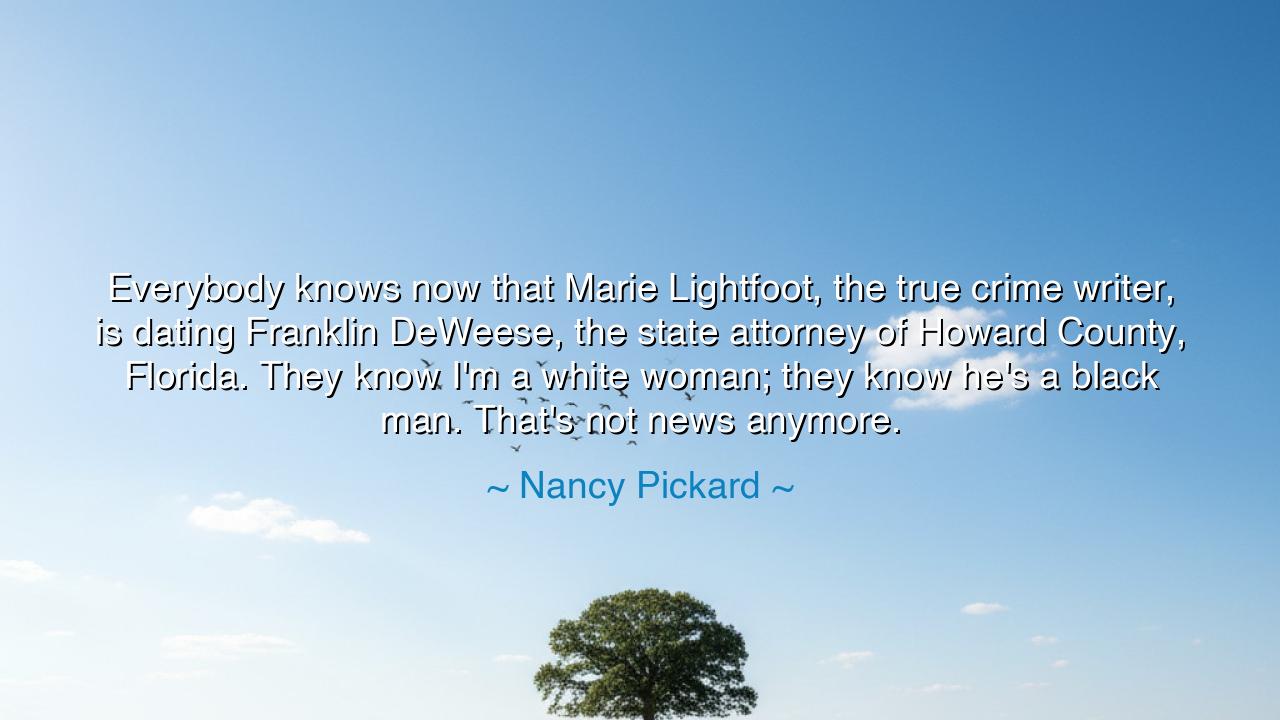
Everybody knows now that Marie Lightfoot, the true crime writer
Everybody knows now that Marie Lightfoot, the true crime writer, is dating Franklin DeWeese, the state attorney of Howard County, Florida. They know I'm a white woman; they know he's a black man. That's not news anymore.






In the plazas where rumor once bartered for bread, a clear voice rises: “Everybody knows now that Marie Lightfoot, the true crime writer, is dating Franklin DeWeese, the state attorney of Howard County, Florida. They know I’m a white woman; they know he’s a black man. That’s not news anymore.” Hear the cadence: from revelation to recognition, from spectacle to settlement. The sentence is a tolling bell announcing that what was once paraded as scandal has ripened into normalcy. It names the slow victory by which private affection ceases to be public controversy, and the human face outlives the headline.
The meaning runs deeper than an update on a relationship. It is a declaration of sovereignty over narrative. In naming herself—Marie Lightfoot, a true crime writer—and her beloved—Franklin DeWeese, a state attorney—the speaker pulls their story out of the carnival of gossip and sets it on the firm stones of vocation and character. Love is not diminished by context; it is clarified by it. Two citizens with work to do meet across dinner tables and legal briefs, and their bond refuses to be reduced to the colors of their skin or the curiosity of onlookers.
The origin of the line lies in Nancy Pickard’s fiction, where Marie Lightfoot speaks as a created voice, yet her claim reaches beyond the page. Fiction sometimes runs ahead of the village and points back, saying, “Catch up.” By placing an interracial romance at the center of a professional, ethical world—true crime and the state attorney’s office—Pickard writes into being what the culture is still learning to see as ordinary: that dignity does not ask permission from prejudice, and competence does not bow to stereotype. Thus the tale becomes a lantern; it lights a path the real world must continue to walk.
History provides the necessary echo. Think of Loving v. Virginia (1967), when Richard, a white man, and Mildred, a black woman, carried their marriage to the highest court and won the right to be simply husband and wife. Their victory did not end all whispers; it transformed the law’s posture from scorn to shelter. The journey from “forbidden” to “not news anymore” is the long work of law, art, and ordinary courage braided together. Novels and lives, rulings and breakfasts, advocacy and affection—each adds a stone to the same road.
There is also a critique nested in the line: the old hunger of media to treat bodies as headlines. “Everybody knows,” the sentence begins—then, with quiet triumph, “and it’s not news anymore.” The flame has been denied its fuel. What remains is a pair of people whose names are not props: Marie Lightfoot and Franklin DeWeese. The shift from spectacle to simplicity is moral progress measured not in fanfare but in the boredom of bigotry losing its audience.
The lesson for us is plain and demanding. First, learn to recognize when attention is a mask for dehumanization. Second, refuse to make a feast of other people’s intimacy—especially when the only seasoning is difference. Third, broaden the canon of “ordinary”: let your imagination, and your institutions, treat interracial, interfaith, and cross-class loves as expected, not exotic. In so doing, you strengthen the common house where everyone may sit without performance.
Let our actions be simple and durable. Speak of people first by their names and their work, not by the categories that once sold papers. In your circles—classrooms, newsrooms, family tables—challenge any framing that turns a couple into a curiosity. Read and recommend stories (like Pickard’s) that render complex love as daily bread. Support policies and practices in law, media, and workplaces that normalize equity without fanfare. And in your own speech, practice the quiet courage of this line: acknowledge difference, honor it, and then let love return to its rightful scale—private, sturdy, and, blessedly, not news anymore.






AAdministratorAdministrator
Welcome, honored guests. Please leave a comment, we will respond soon